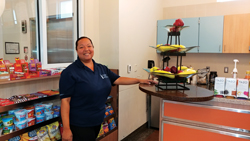Education students seeking to complete their student teaching hours have faced many changes in the structure of these requirements as a result of the ongoing pandemic.
“When a student imagines what their field work is going to be like in their program before COVID, they have a certain idea in their head about what it would be like. Now it’s different because the majority of students are on more of a hybrid or remote base,” explained Corina Earle, Director of Field Placements for the Department of Education. “I wouldn’t say that anybody is missing out, it’s just a different adaptation.”
Many education students are completing their required hours and establishing classroom connections in an entirely virtual setting. “This semester, my field hours are online,” said sophomore music education student Gabriella Estrada. “I get to lead Zoom breakout rooms and have one-on-one sessions with students to go over their assignments or any classwork they may need help with, which allows me to create a more personal connection with the students. It would probably be easier to do that in person, but all in all everything is still the same minus the fact that it’s online.”
Other students have not yet reached the point in their major’s sequence where they start student teaching, but the pandemic has still resulted in a predominantly virtual learning format. “As an Elementary Education major, I didn’t get a formal field placement yet. I was assigned to watch a list of YouTube videos, which were reinforcing what we were doing in class and giving us techniques to use when we do get to go in the field.” said Emma Morris, a sophomore majoring in Interdisciplinary Studies for Elementary Educators.
Every student will eventually get the same number of student teaching hours before graduation, regardless of whether they take place in-person or virtually. “The New Jersey Department of Education did not change requirements regarding hours for student teaching,” said Earle. “At the end of the day, everyone gets the same amount of hours and the same experience working with schools. They’re still getting a valuable experience, even if it is online.”
Professors are attempting to work past the limitations of the pandemic to ensure that they are preparing students for their careers after Monmouth. Jason Fitzgerald, Pd.D., Assistant Professor in the Department of Curriculum and Instruction, explained the steps that many professors are taking to overcome these restrictions.
“As anyone who has taught or taken an online class knows, the two experiences are different,” said Fitzgerald. “We try to replicate collaborative engagement, build positive classroom environments, and promote deep content and conceptual learning, but that doesn’t look the same in every setting, either between or within modes of instruction.”
Monmouth’s award-winning education program has made this online transition more feasible and has continued to provide a quality learning experience for students. “We are fortunate to have one of the best schools of education in the country. A tangible example of that is the award we won from our national accreditor, CAEP, for being one of only 11 institutions in the nation to pass without any recommendations for improvement,” said Fitzgerald. “So, going into the pandemic, we had a strong base for preparing excellent teachers and administrators.”
He said that professors have brought in guest speakers to demonstrate online education strategies. Additionally, the School of Education held a Monday evening speaker series on the topic, and the cooperating teachers, who work with and mentor students as part of their classes, have provided professional development opportunities for students.
“The best part of my own experience has been inviting some of my current and former students to speak with my classes about how to manage remote learning technologies, social-emotional learning, and student motivation,” said Fitzgerald. “Learning from and with our students has been a consistent part of our practice in the School of Education. This pandemic has amplified those relationships in ways that I hope has supported students and strengthened university-school-community connections.”
Regardless of the obstacles brought on by the pandemic, students have continued to persevere and put their best foot forward in their educational endeavors.
“Our MU education students are learning to teach in some of the toughest conditions right now,” explained Fitzgerald. “[They] have consistently risen to the challenge and I think that these students are going to be some of the most creative and technically skilled teachers we have. If they can learn to teach as well as I have seen them teach in these tough circumstances, I know they will be phenomenal teachers once this pandemic is over.”
PHOTO COURTESY of Monmouth University




